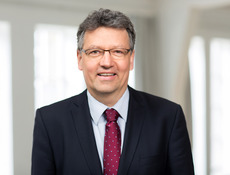In schools and other educational institutions across the country, the fact that Germany has long been a country if immigration cannot be denied. Given that every third child in primary school comes from an immigrant family, educational institutions must do more to adapt to this reality. To date, socioeconomic background remains a key factor in determining educational success in Germany. Clearly, fair education opportunities are a must in a diverse society that seeks social inclusion. In its work targeting fair education opportunities, the Bertelsmann Stiftung has developed a series of proposals and recommended actions to be taken.
![[Translate to English:] Lehrerin erteilt Unterricht in der Bültmannshofschule in Bielefeld]](/fileadmin/files/_processed_/e/b/csm_F1050026_23748_1240x600px_Original_38851_8e83ce16db.jpg)
Veit Mette
Education for an immigrant society
Educational institutions must prepare for the fact that growing numbers of children and youths in Germany are of migrant heritage. In a diverse society where socioeconomic background still heavily influences educational success, equal opportunities in education and labor market participation must be strengthened.
Content
With its youth integration award “All Kids are VIPs,” the Bertelsmann Stiftung has been helping German schools see diversity as an opportunity while honoring youth-organized projects targeting improved integration. Go to Alle Kids sind VIPS (in German).
Creating fair opportunities in education: what must be done?
Creating equal opportunities in education involves providing tailored language support from kindergarten on, that is, throughout the course of a young person’s education. If children of non-German speaking families are to develop the bilingualism essential to improved education opportunities, they will need better native-language instruction. Teacher training should therefore include multicultural skills development and funding provided to help increase the number of teachers with a migrant background. Addressing these issues, the "Improving learning through diversity" Project offers various studies and recommendations for education policy. Read more (in German).
Our Ländermonitor provides access to quantitative and qualitative data on early education development throughout Germany. Read more
Several studies show that even after completing formal education, youths from immigrant families continue to be at a disadvantage in terms of social inclusion. The Lifelong Learning (Lebenslanges Lernen) project details solutions that address this problem.
Our online database Wegweiser Kommune offers key data on school-leaving qualifications, pre-school and training for every town or community with over 5,000 residents in Germany. To the Database (in German).



